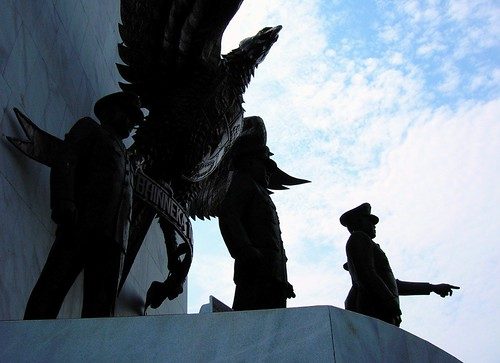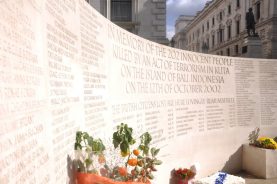In his article published on 27 September 2020, Greg Fealy wrote with concern about Joko Widodo’s (Jokowi) “systematic campaign of repression against Islamists”, especially towards those who are described as “extremists” and “radicalists”. Fealy argued that such a campaign may be welcomed by Indonesia’s western partners, such as Australia.
Nonetheless, Fealy takes issue with the Indonesian government’s categorisation of those who are considered extremists/radical: not just targeting supporters of militant and terrorist groups, but also Muslims who are part of the struggle to establish Islamic law and values in Indonesia and its territories. In scholarly literature, the latter are usually referred to as Islamic fundamentalists. Under Jokowi’s government, Islamic fundamentalist groups are also described as anti-Pancasila and anti-NKRI (Negara Kesatuan Republik Indonesia/The United States of the Republic of Indonesia). Consequently, fundamentalist groups like Hizbut Tahrir Indonesia (HTI) are banned.
It is interesting to see how some Indonesians react to Fealy’s article. Critics from Indonesia (including scholars such as Ade Armando and Azumardi Azra, and government authorities) retorted that Fealy has failed to understand Indonesia’s current situation, and they have underlined that Jokowi is not anti-Islam, and always embraces Islamic groups. These criticisms misunderstand Fealy’s concerns.
The question is, why is the government oppressing and repressing these groups if they express their views without forcing others to follow their ideology, or using harsh/radical (i.e. violent) approaches? Fealy also raised these questions at the ANU Indonesia Project Conference. To push this further we ask, isn’t it common in a society to find people who are for and against systems and policies? Why then is Indonesian government indignant when Pancasila is criticised? In a democratic system, this kind of criticism should only be a problem if it is coercive, harsh, or threatening people’s lives.
Let us return to the issue of religious fundamentalism. Much literature indicates that religious fundamentalism is considered a key predictor in predicting prejudice, group hatred, radicalism, racism, and political intolerance. Religious fundamentalist movements have become a problem in many countries. But it is important to note that religious fundamentalism is found in many religions. If in Indonesia religion is considered vital in influencing everyday interactions, then the existence of religious fanaticism/fundamentalism is inevitable.
Furthermore, there are also religious fundamentalists who use peaceful approaches and oppose the use of violence in their struggle. One of those is HTI, which is perhaps different from other HT groups. When HTI’s website was still active, it clearly stated that they were “seeking to create an Islamic state and establish Islamic law while overtly condemning violent actions” (Yustisia et al, 2020). In our opinion, although one might disagree with their ideology, the fact that they are using a nonviolent approach in their movement demands appreciation. Yet, under Jokowi’s government, such types of Islamic fundamentalism are considered a threat to the state as they disagree with Pancasila and democracy. We argue that as Indonesia is a democratic country, groups like HTI have the right to express their views in peaceful ways.
Perhaps Indonesia has been overwhelmed with discourses of “bahaya laten” (latent danger), and this is why there is so much antipathy to ideologies that differ from the state’s. For instance, communism is banned as it is considered to undermine the state’s ideology of Pancasila and NKRI. Soekarno promulgated Pancasila as the founding principles of the Indonesian state, but also notably conceived of a unification of nationalism, religious ideology, and communism known as NASAKOM. Since the anti-communist purge in 1966 Indonesians have been indoctrinated with the danger of the unseen enemy, and this politics of fear of latent and foreign threats has been embodied by Indonesians. Thus, Indonesia is only tolerant of those who are aligned with state ideology, and criticisms of state ideology and policy are considered unacceptable, with those making criticisms often accused of being a threat to the state and its unity.
The Indonesian government’s obsession with classifying and officially recognising only certain acceptable belief systems also affects groups other than religious fundamentalists. The understanding of a “recognised” religion has excluded the basic rights of “unrecognized” believers. This exclusion includes discrimination in public services and restrictions on religious rights. Furthermore, despite the recent acknowledgement of indigenous religions, the government highlights that it is not a pretext for accepting other religions and will not change the six official religions.
Indonesia should not be lulled by Neo-JI’s seemingly peaceful development.
The Neo-JI threat: Jema’ah Islamiyah’s resurgence in Indonesia follows an old playbook
There is a paradox in this handling of radicalism and intolerant groups in Indonesia. On one hand Indonesia is repressive of religious fundamentalists who are critical of the state ideology, yet it simultaneously fails to protect persecuted minority religious groups. The most frequently targeted are members of minority Islamic group Ahmadiyya, many of whom still live in refuge shelters after being forced out of their communities. A recent study has revealed that Indonesia is one of the most restrictive countries for minority religious groups. Thus, we should reflect on whether Indonesia is pluralist or merely pseudo-pluralist?
Implementing pluralism in Indonesia is a complicated issue and politically laden, yet handling it with consistency, instead of hypocrisy, is necessary. The rule of law should be applied to protect citizens, democracy and pluralism itself. However, ironically the government has focused on excluding those it deems anti-Pancasila rather than dealing with discrimination toward minority religious groups.
Indonesia is at a critical juncture, struggling to break out from the New Order approach toward pluralism. Therefore, it is necessary to strengthen interfaith education and literacy. Additionally, it is also essential to strengthen substantive religious discourse that is humanist and inclusive in the public sphere. Given the tenacity of religious fanaticism/fundamentalism, the government should heed socio-cultural factors that moderate a peaceful and tolerant attitude.
Ultimately, we suggest that an appropriate approach towards religious pluralism in Indonesia is by promoting constant dialogue that embraces openness. In other words, practising Pancasila in the context of pluralism that emphasises the maturity of each member of society to deliberate on their own beliefs, and does not limit any expressions of belief. This, we argue, will become the true mode of living of a pluralist society in a constitutional democracy society.
 Facebook
Facebook  Twitter
Twitter  Soundcloud
Soundcloud  Youtube
Youtube  Rss
Rss 



